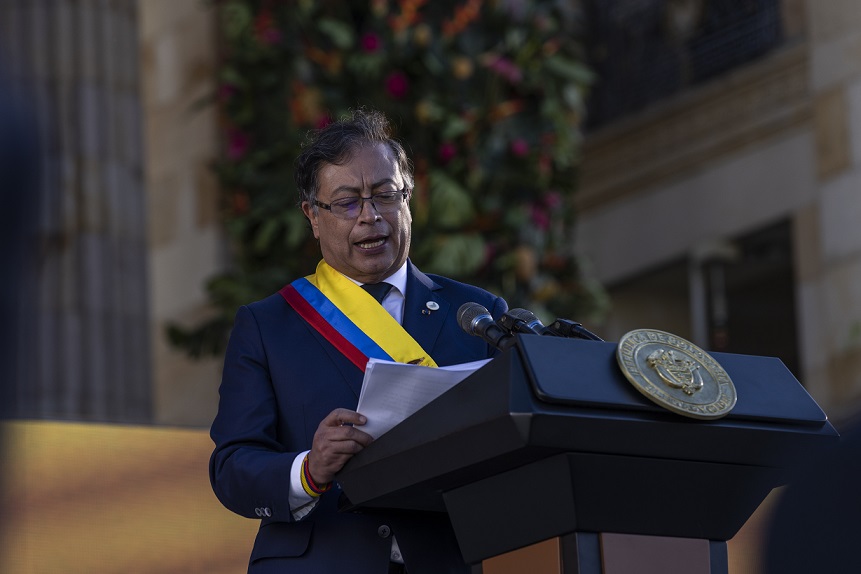The current government’s key policy in Colombia and the participation therein of different sectors of society, particularly women and marginalised communities, will be the issue discussed at a conference organised by ABColombia to be held on 27 April in London.

In a troubled Colombia, whose previous governments have been unable to stop the violence and where the actors in the internal conflict that have generated it have grown more powerful over the years, a proposal has emerged to “get out of the war”.
It comes from the current government of Gustavo Petro and is called Total Peace (Paz Total). It is one of his most ambitious proposals and forms part of the government programme that brought him to the presidency.
Although former president Juan Manuel Santos achieved the historic and ambitious peace agreement signed with the world’s oldest guerrilla group at the time (the self-proclaimed Revolutionary Armed Forces of Colombia – FARC), the violence in Colombia and those who feed it have not stopped. Paramilitaries, drug trafficking groups and clans, guerrillas, organised gangs and common crime are the motors of this war that has taken away Colombians’ peace of mind and their lives, and with whom the current government wants to dialogue and make agreements.
Total Peace, then, consists of sitting down to dialogue and negotiate with all the actors and creators of violence, including the so-called FARC dissidents (‘deserters’ from Santos’ peace agreement, as they refused to demobilise).

Controversial and debatable, it is, Wola notes, “a multifaceted effort that seeks to minimize violence, protect civilians and dismantle the many armed groups operating in Colombia. It pays attention to the lessons learned from the country’s peace and “submission processes”.
But, as journalist Olga Behar says “The main problem with Total Peace is that Petro’s government is shooting its proposal in all directions simultaneously, and its aims are so ambitious that they could become a real danger to its own intentions. For if any of these negotiations fail, a new cycle of violence could be unleashed.” Seeking peace in Colombia is not only difficult but for many an impossible project, especially in a country and a world where so many have interests in war because it is politically and economically so lucrative.
Nevertheless, the proposal – which has the support of the majority of Colombians – continues to move forward amidst successes and mistakes, adjustments and conversations. Criticism has arisen even among its supporters, and different sectors of the population are demanding to be part of these negotiations, or at least to have their voices heard.
In fact, different social sectors are seeking to participate in this process, especially because one of the campaign promises of the current president Petro was to place a strong emphasis on citizen participation.

With this in mind, the British organisation ABColombia has organised an event to be held in person and online, in English and Spanish, entitled “Colombia, Civil Society Participation in the Peace Process and “Total Peace”: Myth or Reality”.
Ricardo Jaramillo, coordinator of the corporation Viva la Ciudadanía (a non-governmental organisation that works for the promotion and defence of rights, development, democracy and peace), has been invited as a guest speaker.
He will talk about the participation of civil society in Colombia under the government of Gustavo Petro, with a special focus on the participation of women and marginalised communities, “in relation to the government’s Total Peace key policy and in terms of the implementation of the Peace Accords signed in 2016”.
In London, Jaramillo will meet with British parliamentarians, including the Human Rights working group of MPs, the Shadow Minister for Latin American Affairs , and members of the UK Foreign and Commonwealth & Development Office (FCDO).
 His visit is part of a speaking tour as a representative of the Alliance of Social and Allied Organisations for International Cooperation for Peace and Democracy in Colombia, a network of 125 social organisations.
His visit is part of a speaking tour as a representative of the Alliance of Social and Allied Organisations for International Cooperation for Peace and Democracy in Colombia, a network of 125 social organisations.
Day, time and venue: Thursday 27 April 2023, 17:30 – 19:30. Pavilion Room, Romero House, 55 Westminster Bridge Road, London, SE1 7JB. To attend in person, register here. To attend virtually register here.
More information: ABColombia.
(Translated by Rene Phelvin. Email: renephelvin@gmail.com) – Photos: Pixabay












.jpg)












